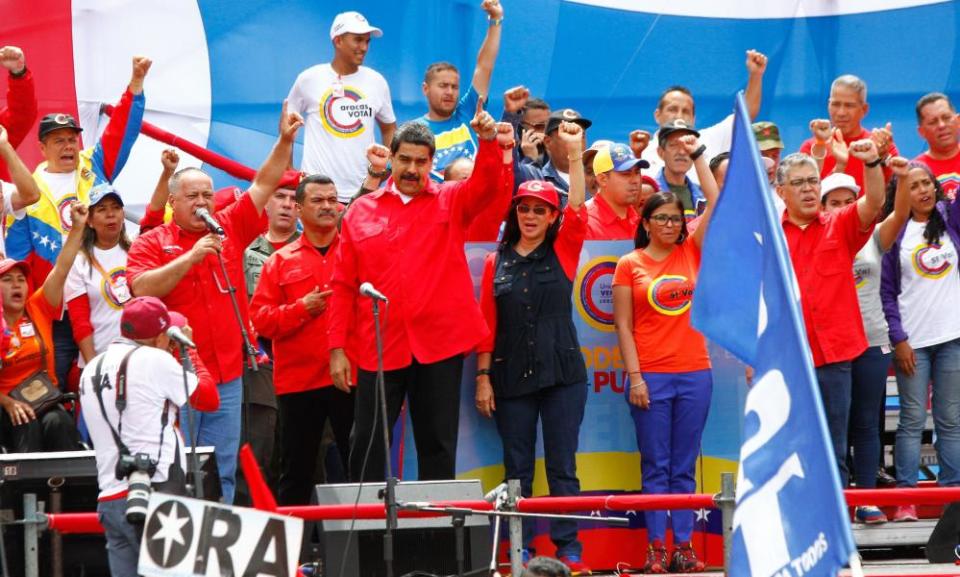Venezuelans plan country-wide protests in open defiance of government ban
‘We will exercise our right to protest every say until it is no longer necessary’

Venezuelans are planning to defy a government ban on public demonstrations and risk deadly repression with marches across the country to protest against a vote Sunday that opposition forces say will mark the end of democracy.
At least four people have been killed this week since the opposition called a two-day strike, adding to the toll of more than 100 dead in a wave of unrest which began in April. The government’s ban on protests – and the opposition’s defiance – only heightened the risk of further violence, as more than 370,000 troops were sent out across the country.
“As they increase their repression we will increase our resistance in the streets. We will exercise our right to protest every say until it is no longer necessary,” said Josefina Álvarez, a 46-year-old cashier at a pharmacy in Caracas.
The protests came two days before the controversial vote called by the government of President Nicolas Maduro to elect a 545-member constituent assembly that will will have the power to rewrite the constitution and dissolve state institutions.
The government says the assembly will open a path to peace for the politically polarised and economically crippled country, while the opposition says it would mark the consolidation of an authoritarian regime.
Julio Borges, the head of the opposition-led National Assembly, said Maduro’s constituent assembly is an attempt to dissolve the country’s democracy. “That’s why we are fighting – so that the country isn’t killed off,” he said.
Closed-door negotiations to avert the showdown are being brokered by former Spanish prime minister Jose Luis Rodriguez Zapatero, but few analysts believe they will succeed.
“Backing down now would make Maduro look very weak among the [government-allied] elites and the military,” said Jason Marczak, of the Atlantic Council’s Latin America center.
Luís Flores, a taxi driver in Caracas, also said he had no faith in a last-minute agreement. “Unfortunately, a negotiation that could have led to a transitional government is no longer an option, because we can’t keep on believing [the government’s] lies while they cling to power and continue to destroy our economy and crush any dissent,” he said.
Meanwhile, international pressure continued to mount against Maduro as Delta joined Avianca in suspending flights in and out of the country, and the US state department ordered the families of its embassy staff to leave Venezuela.
The US has threatened unspecified sanctions if the vote goes ahead. As a prelude, the US treasury department announced this week that it was freezing the assets of 13 current and former members of the government and the state oil firm PDVSA. Thumbing his nose at the measure, Maduro awarded each of the sanction persons a replica of a sword used by a national independence hero.
The new measures spared Venezuela from broader financial sanctions or “sectoral” sanctions targeting its oil industry, a move which analysts have warned could further exacerbate the already critical humanitarian situation.
Venezuela relies on oil exports for 95% of its income, and the country’s foreign currency reserves – currently at less than $10bn – hit their lowest ever level earlier this month.
UK foreign secretary Boris Johnson in a statement called on Maduro to “change course and break the deadlock for the benefit of all Venezuelans”. And the United Nations human rights office said it was “deeply concerned” about the “very tense and very difficult situation” in Venezuela.
Colombia, which has been bracing for a flood of immigrants from its neighbouring country, announced on Friday that it was granting a special permit for Venezuelans already in the country to remain for up to two years.
If the assembly is seated the “fever and ferocity of the protests will escalate”, Marczak predicted.
Borges, the national assembly leader, said it would mark a new juncture for the opposition. “We will spearhead a new stage where along with our citizens we do not abandon the street until we can restore democracy in Venezuela,” he said.

